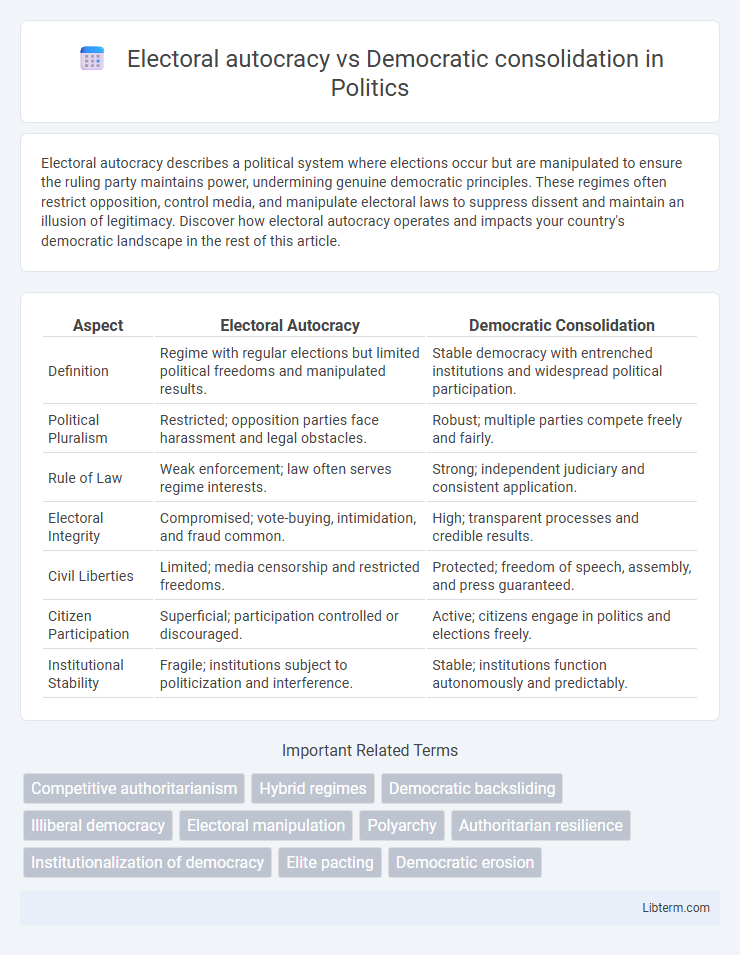Electoral autocracy describes a political system where elections occur but are manipulated to ensure the ruling party maintains power, undermining genuine democratic principles. These regimes often restrict opposition, control media, and manipulate electoral laws to suppress dissent and maintain an illusion of legitimacy. Discover how electoral autocracy operates and impacts your country's democratic landscape in the rest of this article.
Table of Comparison
| Aspect | Electoral Autocracy | Democratic Consolidation |
|---|---|---|
| Definition | Regime with regular elections but limited political freedoms and manipulated results. | Stable democracy with entrenched institutions and widespread political participation. |
| Political Pluralism | Restricted; opposition parties face harassment and legal obstacles. | Robust; multiple parties compete freely and fairly. |
| Rule of Law | Weak enforcement; law often serves regime interests. | Strong; independent judiciary and consistent application. |
| Electoral Integrity | Compromised; vote-buying, intimidation, and fraud common. | High; transparent processes and credible results. |
| Civil Liberties | Limited; media censorship and restricted freedoms. | Protected; freedom of speech, assembly, and press guaranteed. |
| Citizen Participation | Superficial; participation controlled or discouraged. | Active; citizens engage in politics and elections freely. |
| Institutional Stability | Fragile; institutions subject to politicization and interference. | Stable; institutions function autonomously and predictably. |
Defining Electoral Autocracy and Democratic Consolidation
Electoral autocracy refers to a political system where elections occur but are manipulated to undermine genuine democratic competition, resulting in limited political freedoms and controlled opposition. Democratic consolidation is the process through which a democracy matures, becoming stable and institutionalized with widespread public support for democratic norms, rule of law, and free political participation. Defining these concepts highlights the contrast between pseudo-democratic regimes sustaining authoritarian control and countries progressing towards durable, participatory governance structures.
Key Characteristics of Electoral Autocracies
Electoral autocracies maintain the facade of multiparty elections while systematically undermining democratic institutions through controlled media, restricted opposition, and manipulated electoral processes. Key characteristics include limited political pluralism, significant state influence over electoral commissions, and recurrent allegations of voter suppression or fraud. These regimes prioritize regime survival over genuine democratic consolidation, resulting in weakened rule of law and reduced political accountability.
Hallmarks of Democratic Consolidation
Hallmarks of democratic consolidation include the widespread acceptance of democratic institutions, the rule of law, and the protection of civil liberties, ensuring political competition and participation are fair and meaningful. In contrast, electoral autocracy maintains the facade of elections while undermining genuine political pluralism by restricting opposition, manipulating media, and stifling judicial independence. Democratic consolidation is characterized by stable democratic norms, institutional resilience, and an empowered civil society that holds leaders accountable beyond mere election cycles.
Historical Context: Trends in Political Systems
Electoral autocracy describes regimes where elections occur but lack fairness, transparency, and genuine competition, often maintaining authoritarian control under the guise of democracy. Democratic consolidation refers to the process where democratic institutions become stable and widely accepted, preventing a return to authoritarianism. Historically, many countries shifted from electoral autocracies to consolidated democracies through increased political participation, strengthened rule of law, and independent institutions fostering accountability and pluralism.
Mechanisms of Power in Electoral Autocracies
Electoral autocracies maintain control through mechanisms like manipulating electoral laws, restricting opposition parties, and controlling media narratives to create an illusion of democratic competition. These regimes often employ state resources and security forces to intimidate voters and suppress dissent, consolidating power without fully free and fair elections. Unlike democratic consolidation, which relies on institutionalizing checks and balances and fostering political pluralism, electoral autocracies prioritize centralized authority and limited political contestation to sustain governance.
Institutional Foundations of Democratic Consolidation
Electoral autocracy features competitive elections lacking genuine political competition, where ruling elites manipulate institutions to maintain power. Democratic consolidation relies on robust institutional foundations such as an independent judiciary, free press, and effective electoral bodies to ensure accountability and protect civil liberties. Strong checks and balances, transparent governance, and well-established rule of law prevent democratic backsliding and foster long-term political stability.
Case Studies: Comparing Global Examples
Electoral autocracy, characterized by flawed elections and limited political freedoms, contrasts sharply with democratic consolidation, where institutions stabilize and political competition is genuinely open. Case studies from countries like Hungary and Turkey demonstrate the erosion of democracy through electoral manipulation, while examples from South Korea and Costa Rica highlight successful democratic consolidation marked by transparent governance and active civil society. Comparative analysis reveals that sustained democratic consolidation depends on independent judiciary, free media, and robust electoral systems, which are often undermined in electoral autocracies.
Factors Leading to Electoral Autocracy
Electoral autocracy arises when competitive elections occur under conditions of limited political pluralism, restricted media freedom, and weakened judicial independence, undermining genuine democratic processes. Factors leading to electoral autocracy include deliberate manipulation of electoral laws, harassment of opposition parties, and state control over information dissemination, which erode transparent electoral competition. Weak institutional checks and balances, combined with concentrated executive power, create an environment where authoritarian leaders maintain power under the guise of democratic legitimacy.
Challenges to Achieving Democratic Consolidation
Electoral autocracy presents significant challenges to democratic consolidation by undermining free and fair elections, limiting political pluralism, and weakening institutional checks and balances. Persistent electoral manipulation, media control, and repression of opposition curtail the development of robust democratic norms and civil society engagement. These barriers hinder the establishment of stable democratic governance, fostering political instability and eroding public trust in democratic processes.
Prospects for Transition and Reform
Electoral autocracy presents significant challenges to democratic consolidation due to limited political competition, restricted civil liberties, and manipulated electoral processes, which hinder genuine government accountability and citizen participation. Prospects for transition and reform depend on factors such as internal elite divisions, pressure from civil society, international influence, and the robustness of institutional frameworks that can support gradual shifts toward democratic norms. Successful reform efforts often require sustained mobilization for electoral transparency, legal reforms to enhance political freedoms, and strengthened checks and balances to prevent authoritarian regression.
Electoral autocracy Infographic

 libterm.com
libterm.com